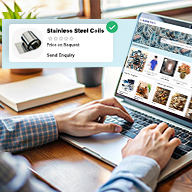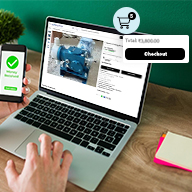10 things you should do before launching your e-commerce website

Ecommerce
304 week ago — 7 min read
Months of hard work have gone into building the perfect e-commerce store which you are now ready to launch. But just like a brick and mortar store that requires a proper pre and post launch strategy, your e-commerce store also deserves the much needed attention to be able to create the magical first impression on its buyers.
Here is a 10 point checklist that you should keep in mind while starting an online store:
1. Set up an analytics tool
One of the most important things to keep in mind while launching your e-commerce website is to have an analytics tool in place. You should be able to figure out the exact amount of traffic you are getting on your website and one commonly used tool that you can use is Google analytics. This requires you to add a small code to your website and establish your sales goals. Google analytics allows you a sneak peek into how your website is behaving on multiple platforms, helps you analyse your customer behaviour; how long are they spending on your website, which products are they buying and why they are bouncing off your site.
Google analytics is a free tool that any e-commerce store owner can use with ease but if you want to avoid that you can easily set up your e-store via LINKER.store that has its own analytics tool built-in. Our e-commerce specialists handhold you from building a store to helping you analyse the performance of your e-store. All for free!
It is absolutely necessary to have a social media presence if you want to be relevant in today’s e-commerce market.
2. Optimise all your images for SEO
In today’s world, a good product image can lead to a great user experience. And it is very important that you optimise all the images for SEO so that they come up on search results. Here are few tips that you can follow:
- Name your images properly. This helps with SEO ranking.
- Give proper attributions to your ‘alt tags’. Try inserting your targeted keywords.
- Use the correct file size for images. Your images shouldn’t be too large or too small. It should be optimised to be viewed in both web and mobile versions with ease.
- Test your images to check which are working for your website.
Also read: Remarketing: Benefits for small businesses & the different tools you can use
3. Optimise and cross-check your content for SEO
Just as you optimise the product images for SEO, it is equally important to make sure that the content you are putting up on your website is relevant and SEO friendly. Here are few tips that you can follow:
-
Great product description
Product descriptions that are small are usually considered low quality by search engines. Write product descriptions that sell.
-
Beware of duplicate content
Multiple products of the same variant (for example, one shirt, multiple colours) are taken as duplicate content by search engines. In order to avoid that, make sure you mention the canonical link to the main product page.
-
Correct tags for products
One way to ensure that each of your products is unique is to tag them properly so that they are visible and easily clickable for your customers.
4. Have a social media presence
It is absolutely mandatory to have a social media presence if you want to be relevant in today’s e-commerce market. Via social media, people can easily like, purchase and recommend your products to their friends and family, thereby increasing your sales and making your products more popular. Try using the same profile name across all platforms to maintain uniformity and boost recognition. Customise your profile picture and all the product pictures you upload to make them easily viewable for your customers.
5. Create a newsletter
A great way to get inside the minds and hearts of your customers is an email newsletter which is a strong marketing tool to possess. Establishing an email newsletter will conveniently allow you inside the subscriber’s inbox on a regular basis. This way you can share regular updates, deals and offers with your customers.
Also read: Sell online: Your own e-commerce store vs. marketplaces
6. Check the payment gateways
A great e-commerce platform requires an equally great payment gateway. You certainly don’t want your buyers to get disappointed in the last step. Run several tests before closing in the selected gateways. Try placing a test order to see if the payment gateway is working efficiently.
7. Shipping and delivery
A report on delivering consumer choice reveals an interesting data:
- 66% of consumers purchased goods from e-sellers who provided more delivery options
- 49% of consumers paid more just to get a smoother delivery experience
- 96% of consumers will shop again from an e-store if their previous experience has been good
So, it is imperative that you focus on shipping and delivery and hire a trusted logistics partner to deliver a smooth buyer experience to your customers. You can also offer free shipping on certain goods to keep your customers interested in your products.
8. Create a backup
Creating backup for your website is a must. As your product inventory gets updated every day, it is important that you backup all the data to avoid any misuse or loss of products.
9. Cross check everything before the big launch
Once everything is in place, cross check and test run the website to make sure everything is working efficiently. Whatever goes on your website must be error-free. Double check the landing pages, links and product descriptions/prices etc.
10. Plan for the D-day
All the time and energy that you have invested in creating the e-commerce store should shine through and for that you need to plan the launch. Create a buzz around your business so that people are automatically attracted to your e-store. Give introductory discounts and offers and invest in platforms you want to go live on. You can even hire a PR agency to help you with the same.
With these tips in hand, don’t let any factor stop you from making your business a huge success!
Also read: Are you forgetting your repeat customers?
Image courtesy: freepik.com
To explore business opportunities, link with me by clicking on the 'Connect' button on my eBiz Card.
Disclaimer: The views and opinions expressed in this article are those of the author and do not necessarily reflect the views, official policy or position of GlobalLinker.
Posted by
GlobalLinker StaffWe are a team of experienced industry professionals committed to sharing our knowledge and skills with small & medium enterprises.
Network with SMEs mentioned in this article
View GlobalLinker 's profile
Most read this week














Comments (1)
Share this content
Please login or Register to join the discussion